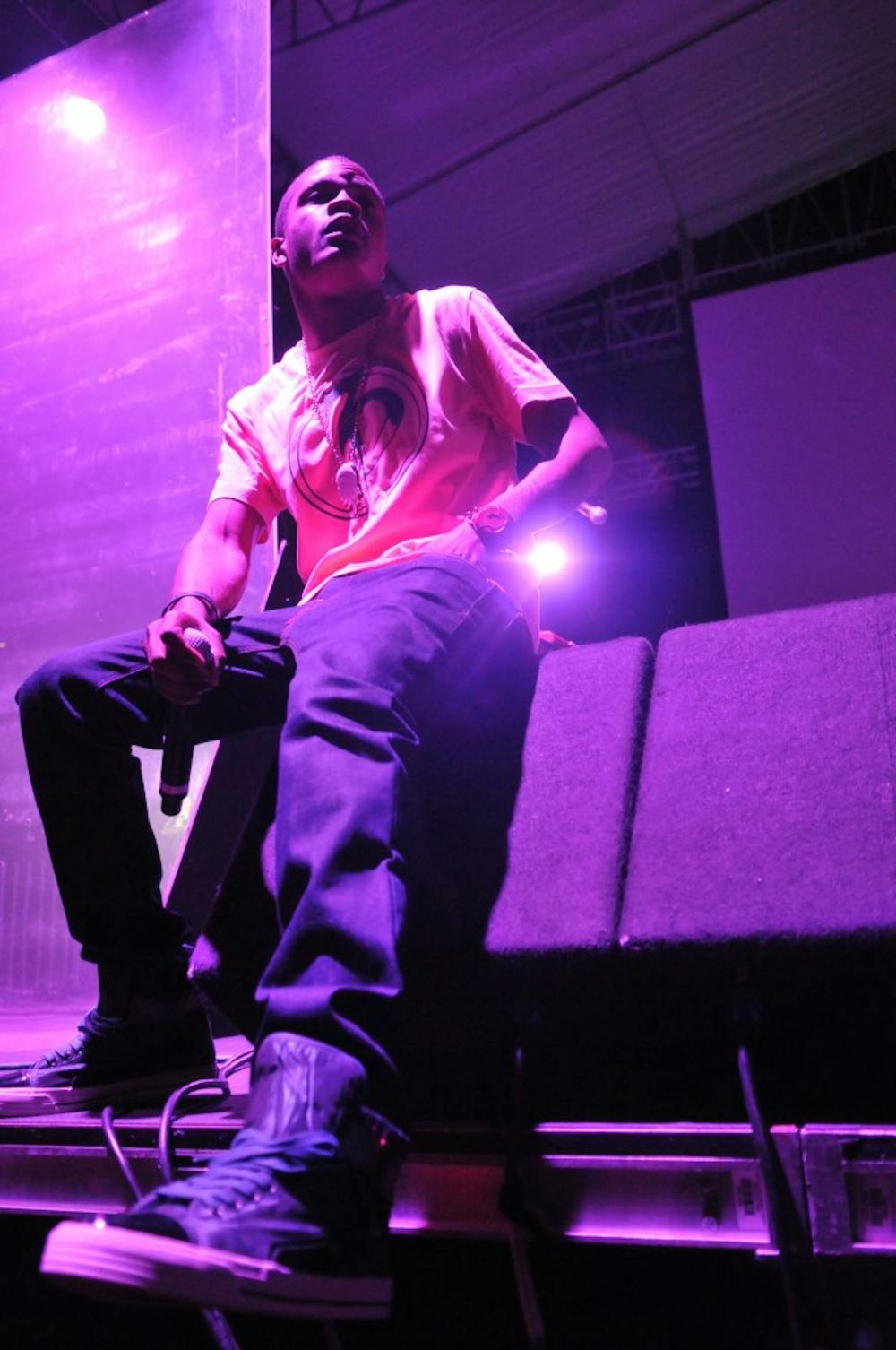1. Dosage Was a Surprise, And a Pleasant One, Too When the DP published a cover story on SPEC’s inability to peg down a fourth artist for Spring Fling, it was hard not to feel a bit disappointed. Many, including your friendly music editors, were searching for a performer with more artistic pedigree. Probably a larger contingent was hoping for a headliner with a bigger headlining name. Dosage—the Philadelphia rapper of little fame who has toured with Lupe Fiasco in the past—filled neither of these needs. But what he did do is arguably more important: he added a degree of serendipity and randomness to the most regimented brand of live music.
Stepping on stage before Ratatat (and before most concertgoers had even arrived) Dosage’s set was a high-energy affair, masking his somewhat mediocre lyricism with a basic knack for performance. Most students had no idea who this rapper was (trust us, we asked around), but this shouldn’t matter. Everyone knows what to expect at a Spring Fling concert: Two or three artists will play, at least two will give a ra-ra shout-out to Penn, at least one will get the name of the school wrong (we’re looking at you, Snoop Dogg), at least a dozen kids will get carted off in ambulances and at least everyone will make a drunken, stoned mess of themselves. What Dosage brought was something different—an unannounced opener, he took the audience off-guard. And at a concert as predictable as Spring Fling, it’s probably the coolest thing he could have done.
2. Ratatat Can Translate to a Drunk/High College Crowd But They Would Still Hate Tri-Delt’s Fratatat Hats
We really do have to give props to the band for playing a show that found a balance between art and entertainment — or, more accurately, for creating art that also happens be entertaining. SPEC can have some of those props, too.? While it may seem to some that instrumental rock is like playing tennis without a net, Ratatat’s set was remarkably danceable, especially for those lucky few on the floor. We had our doubts when SPEC announced that a band with such subtle music would be playing such a big, impersonal venue. But we were impressed.
3. Flo Rida’s best song wasn’t even written by him… As if to exemplify the laziness of the modern top 40, club rappers have developed an annoying propensity for covering the biggest hits by their club rap brethren during live performances. At a concert like Fling, this keeps the crowd engrossed in a performer whose deeper cuts may not be very deep. And for most artists it’s a harmless move: it’s doubtful that a cover will garner more excitement than an original hit. Unless this artist happens to be Flo Rida. In a show that seemed aimed at the lowest (drunkest) common denominator, Flo Rida played some of the worst songs we’ve ever had the misfortune of hearing in a live setting. And he even played some of these songs more than once—the itunes chart mainstay “Club Can’t Handle Me” was treated to an end-of-show chorus reprise that only further inscribed how hopelessly generic the song sounds live. But the biggest slip-up was his decision to play something with actual substance: Flo’s cover of Lil Wayne was invigorating and effecting. And when presented alongside a slew of generic club jams, it could only put everything else to shame.
4. …BUT He Was Still a Pretty Damn Good Showman
Like giving a girl a roses and chocolates, there are some crowd-pleasing acts that, while tried, are definitely still true. Climbing down into the audience at a concert is one of them. Another is having randomly-selected crowd members join you onstage to dance, even letting some of them sing a verse or two. These sorts of gestures don’t go unnoticed. (Also, for the record, that weird, irritating sound that was played after each song didn’t go unnoticed either. What the eff was that?)? From an artistic standpoint, Flo Rida’s shortcoming is that he sings for the club. But this turns into a strength while entertaining a bunch of people who (at the time) have only enough mental capacity to process club-related happenings.
5. The audience wanted Lupe to be a club rapper, too. But that just isn’t his thing. You’ll have to forgive the pun, but the release of Lupe’s third album, Lazers, has become the most typical of major-label fiascos. A clear attempt to turn an eccentric, socially-conscious rapper into a big-money hitmaker (of the Flo Rida variety), Lupe’s latest was panned by critics and treated ambivalently by the artist himself. And it only makes sense: in an age in which club music dominates the charts, Lupe is a living rebuke to the club mentality. He’s a Muslim who has been quoted as saying he doesn’t drink, who enjoyed jazz more than rap as a child because he felt rap was too vulgar. Lupe is no party animal—and he might have been the only sober soul at the entire Fling concert.
And the rapper’s performance on Friday night was a microcosm of this greater conflict. Though a sense of showmanship was evident, Lupe never really broke free of his conflicted identity. The audience wanted a party, and what they got was a few half-hearted attempts at party-anthem anonymity sandwiched between some genuinely thoughtful verses and hard-nosed beats. It all just felt kind of fake, and coming from a rapper as raw as Lupe, anything less than completely real can only be a disappointment.

